

Academic Phrasebank - A compendium of academic phraseology. Choosing Your Words and Improving Your Writing. Qualitative research methods for the social sciences - english ... Interviews: Sampling Strategy. Research Sample While some interview research is quantitative, like survey research, most interview projects are qualitative in nature.
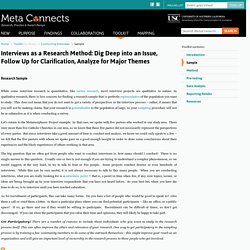
In qualitative research, there is less concern for finding a research sample that is perfectly representative of the population you want to study. This does not mean that you do not want to get a variety of perspectives in the interview process – rather, it means that you will not be making claims that your research is generalizable to the population at large, so your sampling procedure will not be as exhaustive as it is when conducting a survey.
Let's return to the Metamorphosis Project example. In that case, we spoke with five pastors who worked in our study area. The big question that we often get from people who want to conduct interviews is, how many should I conduct? El espejismo de la erudición y los “journals depredadores" La presión sobre los investigadores para producir estudios científicos ha traído consigo la proliferación de editores deshonestos y papers falsos o innecesarios.
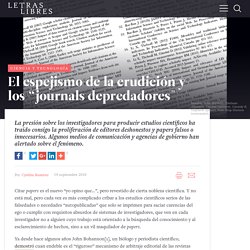
Algunos medios de comunicación y agencias de gobierno han alertado sobre el fenómeno. Citar papers es el nuevo “yo opino que…”, pero revestido de cierta nobleza científica. Y no está mal, pero cada vez es más complicado cribar a los estudios científicos serios de las falsedades o necedades “autopublicadas” que solo se imprimen para saciar carencias del ego o cumplir con requisitos absurdos de sistemas de investigadores, que ven en cada investigador no a alguien cuyo trabajo está orientado a la búsqueda del conocimiento y al esclarecimiento de hechos, sino a un vil maquilador de papers. Ya desde hace algunos años John Bohannon[1], un biólogo y periodista científico, demostró cuan endeble es el “riguroso” mecanismo de arbitraje editorial de las revistas especializadas. Entre los hallazgos, Nature destaca que: Ontological and Epistemological Foundations of Qualitative Research. Volume 10, No. 2, Art. 30 – May 2009 Ontological and Epistemological Foundations of Qualitative Research Irene Vasilachis de Gialdino Abstract: The purpose of this paper is to describe the most relevant features of qualitative research in order to show how, from the Epistemology of the Known Subject perspective I propose, it is necessary to review first the ontological and then the epistemological grounds of this type of inquiry.
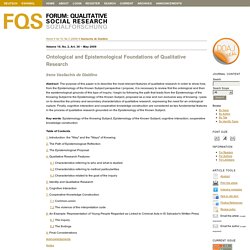
I begin by following the path that leads from the Epistemology of the Knowing Subject to the Epistemology of the Known Subject, proposed as a new and non exclusive way of knowing. Methods of prospective > Softwares > Strategic Prospective Workshops : La prospective. These workshops were developed in 1985 and have been applied hundreds of times.
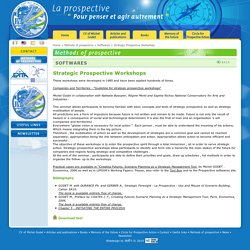
Companies and Territories - "Guideline for strategic prospective workshops" Michel Godet in collaboration with Nathalie Bassaler, Régine Monti and Saphia Richou National Conservatory for Arts and Industries - This seminar allows participants to become familiar with basic concepts and tools of strategic prospective as well as strategic mobilisation of people. All predictions are a form of imposture because future is not written and remain to be made.
What is Design Methodology? Design methodology refers to the development of a system or method for a unique situation.
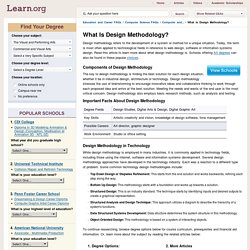
Today, the term is most often applied to technological fields in reference to web design, software or information systems design. Read this article to learn more about what design methodology is. Schools offering Art degrees can also be found in these popular choices. HKU - Faculty of Education - Faculty Research Ethics Committee - Research. FREC Delegates for Undergraduate and Taught Postgraduate StudentsAs stipulated in the University’s Policy on Research Integrity, "All experiments or other forms of research project, where the University has an interest, involving consent of human participants and the use of vertebrate animal subjects must obtain prior approval of the appropriate Ethics Committee.
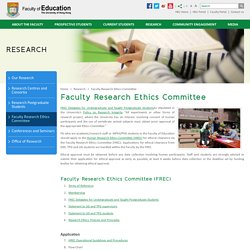
" PIs who are academic/research staff or MPhil/PhD students in the Faculty of Education should apply to the Human Research Ethics Committee (HREC) for ethical clearance via the Faculty Research Ethics Committee (FREC). Applications for ethical clearance from EdD, TPG and UG students are handled within the Faculty by the FREC. Ethical approval must be obtained before any data collection involving human participants. Application. Research Services - Human Research Ethics Committee (HREC)
In line with the HKU Policy on Research Integrity, Principal Investigators (PIs) who are academic/research staff members or research students (MPhil/PhD) in Faculties other than Medicine and Dentistry should apply to the Human Research Ethics Committee (HREC) for ethical clearance for research involving human participants.
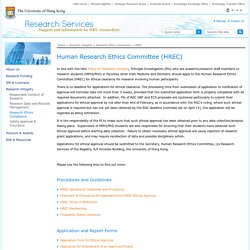
There is no deadline for applications for ethical clearance. The processing time from submission of application to notification of approval will normally take not more than 3 weeks, provided that the submitted application form is properly completed with all required documents attached. In addition, PIs of RGC GRF and ECS proposals are cautioned particularly to submit their applications for ethical approval by not later than end of February, as in accordance with the RGC's ruling, where such ethical approval is required but has not yet been obtained by the RGC deadline (normally set on April 15), the application will be regarded as being withdrawn.
Approved Projects. Maurizio Ferraris. Maurizio Ferraris (born February 7, 1956 in Turin) is an Italian philosopher and scholar.
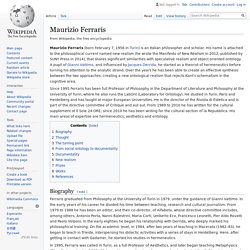
His name is attached to the philosophical current named new realism (he wrote the Manifesto of New Realism in 2012, published by SUNY Press in 2014), that shares significant similarities with speculative realism and object oriented ontology. A pupil of Gianni Vattimo, and influenced by Jacques Derrida, he started as a theorist of hermeneutics before turning his attention to the analytic strand. Over the years he has been able to create an effective synthesis between the two approaches, creating a new ontological realism that rejects Kant's schematism in the cognitive area.
Since 1995 Ferraris has been full Professor of Philosophy in the Department of Literature and Philosophy at the University of Turin, where he also runs the LabOnt (Laboratory for Ontology). He studied in Turin, Paris and Heidelberg and has taught at major European Universities. Biography[edit] Thought[edit] The turning point[edit] Pearson Embedded a 'Social-Psychological' Experiment in Students' Educational Software [Updated]
Information and Learning Science information. Information and Learning Science advances inter-disciplinary research that explores scholarly intersections shared within 2 key fields: information science and the learning sciences / education sciences.
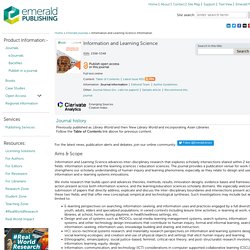
The journal provides a publication venue for work that strengthens our scholarly understanding of human inquiry and learning phenomena, especially as they relate to design and uses of information and e-learning systems innovations. We invite research that builds upon and advances theories, methods, results, innovation designs, evidence bases and frameworks for action present across both information science, and the learning/education sciences scholarly domains. We especially welcome the submission of papers that directly address, explicate and discuss the inter-disciplinary boundaries and intersections present across these two fields, and that offer new conceptual, empirical and technological syntheses.
Such investigations may include but are not limited to: HKU - Faculty of Education - Faculty Research Ethics Committee - Research. Three Steps for Giving Feedback That Works: Find It, Flip It, Elevate It. Research Progress Report - Guide to Graduate Studies - Chemistry - Carnegie Mellon. For students entering Fall 2015 and later Each student must write and present a detailed progress report on the current project, along with relevant background and future thesis plans for 1–2 years, and show breadth and depth of knowledge at the oral candidacy examination appropriate for a successful Ph.D. in that research area by the fourth semester in residence.
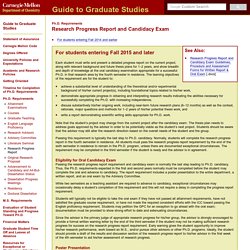
The learning objectives of the requirement are for the student to: Note that the student’s project may change from the current project after the candidacy exam. The thesis plan needs to address goals approved by the advisor in order to be potentially viable as the student’s next project. Research progress - The University of Sydney. Doctoral learning journeys final report 0. DBIR ⇢ Homepage. Using Gestalt Theory in Visualizations and Presentations.
The Phillips ROI Methodology. Research Methodology for Design. Premium Profile - BMI™ Personality Test. Big Data Analytics with Microsoft. Research Methodology Lecture for Master & Phd Students. Dedoose. Journal Rankings on Education. Bridging the gap between self-directed learning of nurse educators and effective student support. Background: Self-directed learning requires the ability to identify one’s own learning needs, develop and implement a plan to gain knowledge and to monitor one’s own progress. A life-long learning approach cannot be forced, since it is in essence an internally driven process. How to Write a Good Thesis Introduction: From General to Specific. How do you about writing a thesis introduction? Is there a way to do it to ensure that you put across the message more effectively?
This article discusses one of the ways to make the introduction a logical explanation of the contents of a thesis. Writing the introduction follows a deductive approach. Read on how the general to specific method works.
PhD Toolkit. Free templates and planners available for you to download. The book Planning Your PhD describes a number of planners and forms you can use to help plan your PhD. You can download these planners and forms below. This Six Months This form helps you identify your targets for the next six months .. Free This Week Use this form to map out your tasks for the coming week .. To Day List. The University of Edinburgh. Writing up and submitting your thesis on time should be your priority in your final year, but you should also make time to prepare for your next steps. Typical milestones These are the sorts of actions you will need to consider taking during the end phase of your PhD. Completing your research: draw up a plan to cut writing up into manageable pieces chapter by chapter; complete a first draft submit thesis and practice for the viva viva, corrections and graduation....celebrate!
The University of Edinburgh. A quick summary of the different phases of your PhD, and signposting to development support. Includes our PhD Planner to download. Download our PhD planner. 5 Questions on Design-Based Research Partnerships, Answered - Urban Education Reform: Bridging Research and Practice. LAK17: doctoral consortium. A very busy week in Vancouver at the LAK17 (learning analytics and knowledge) conference kicked off with the all-day doctoral consortium on 14 March (funded by SoLAR and the NSF). I joined Bodong Chen and Ani Aghababyan as an organiser this year and we enjoyed working with the ten talented doctoral students from across the world who gained a place in the consortium. The intention of the doctoral consortium was to support and inspire doctoral students in their ongoing research efforts.